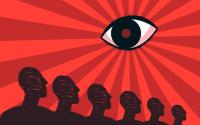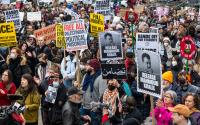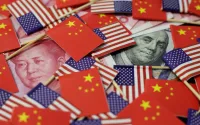4 June 2007Paul Vallely
There is something more morally binding about a promise when it is made by the rich to the poor. There is something altogether more shocking, therefore, when such a solemn pledge seems about to be broken.
Two years ago, the leaders of the rich world met at the G8 summit in Gleneagles and undertook to double annual aid to poor nations to $50bn (£25bn) a year. Half of that money was to go to the world's poorest people in Africa.
But on the eve of the latest G8 summit, in the Baltic resort of Heiligendamm in Germany this week, it is clear the rich world is well off track to deliver what the world's eight most powerful leaders signed up to after the biggest political lobby in history, a massive global campaign to make poverty history that culminated in 10 Live8 concerts watched by more than half the population of the world.
Overall aid to Africa has risen by less than half of what is needed to stay on track to reach the Gleneagles goal to double annual aid by 2010. A report by Oxfam yesterday suggested that, if present trends continue, the G8 will miss its target by a staggering $30bn.
Even the country which has done best in keeping its word, the UK, is projected to fall short of its promise of $14.9bn by $1.6bn. The country that has failed most so far, Italy, will be a whopping $8.1bn short of the $9.5bn it has vowed to give.
To those for whom such huge figures are meaningless, Oxfam offers some graphic illustrations. Last year, the rich world spent three times more on bottled water ($58bn) than it did on aid to Africa ($18bn). We spent 10 times more on military expenditure ($1trillion) than we did on aid globally ($104bn).
We Britons spent almost twice as much on champagne and other wine last year as we did on aid. The French spent more on perfume, German women more on shoes, Italians more on ice cream and the Japanese spent more on luxury goods such as Gucci bags and Prada sunglasses than their governments did on the world's poor.
Despite the Gleneagles promises, global aid actually fell in 2006 for the first time in 10 years. Aid to Africa has grown only 2 per cent since 2004.
"This is a very big potential shortfall," says the man who negotiated the Gleneagles deal from the British end, Lord Jay of Ewelme, who was then, as Sir Michael Jay, Head of the Diplomatic Service. He was the prime minister's personal representative, or sherpa, in the run-up to the summit.
His is the language of the Whitehall mandarin. He points out the caveats. Aid was down in 2006 because 2005 had been a bumper year. The quoted aid figures don't include the massive amounts of debt cancellation that were put through in 2006. Even so, the architect of Gleneagles concludes that, two years on, the outcome is "really disappointing".
Britain is the honourable exception here. Our aid budget, which is today nearly three times what it was 10 years ago, went up by a substantial 13 per cent last year, not including debt cancellations. But aid increased in France by just 1.4 per cent and in Germany by less than 1 per cent. Canada, Japan and the United States are all substantially down, according to the Oxfam figures. And Italy's aid budget has been slashed by a massive 30 per cent.
Will Heiligendamm change this? The word from inside the pre-summit negotiations is that Canada and Italy are being difficult. The current G8 president, Chancellor Angela Merkel, by contrast, on Friday announced a $750m boost to Germany's aid budget in 2008, with an extra $3bn over the next four years.
There are encouraging signs from Washington too. President Bush, who, surprisingly to many, has almost tripled American aid to Africa since he took office, has just announced his $15bn five-year President's Emergency Plan For Aids Relief (PEPFAR) will have its funding doubled from 2009.
"What is needed," says Lord Jay, "is to reconfirm the Gleneagles promises together with some specific undertakings on health and education programmes to put flesh on them."
That means rich nations must come up with the cash to fully fund the UN Education Fast Track Initiative by matching the $8.5bn the UK has pledged over the next 10 years. They need to pay into the replenishment of the Global Fund to Fight Aids, Tuberculosis and Malaria which falls due in September too. And they must make long-term commitments to support African governments' national plans on education and their strategies against Aids too.
In particular they need to scale-up initiatives that have already been shown to work. Thanks to the debt deal done at Gleneagles - which has written off $38bn so far, to 18 African countries - health care is now free in rural Zambia, says Oxfam, education is free for all children in Ghana, and Malawi is training 4,000 more teachers each year.
The Gleneagles promise on Aids has increased the number of Africans on anti-retrovirals tenfold. Some 1.3 million people - a quarter of those in need - are now receiving treatment, saving 250,000 lives last year. But, as Oxfam points out, 500,000 more could be saved if rich nations stump up $16.6bn more, as promised.
Angela Merkel's first summit as president of the G8 will be Tony Blair's last. "Personalities are hugely important," says Lord Jay. "I've been to four G8 summits and 17 European Councils and personal chemistry really does work. Bush is not going to want to come to Heiligendamm and spoil the party for Blair and Merkel, two leaders to whom for different reasons he's very close."
Some agreement has been reached already on what the final communiqué will say on international trade. But, in the end, a deal to make trade fairer for Africa can only be done at the world trade talks which come to their final crunch-point in mid June - which is just before President Bush's "fast-track authority" to agree a trade deal without the approval of the US Congress runs out.
What is needed at Heiligendamm is for G8 leaders to increase the trade talks momentum by approving a $4bn "aid for trade" package, agree 100 per cent market access for poor countries and more and flexible "Rules of Origin" that recognise the value added to products by Africans.
Lord Jay's successor and the other sherpas are still locked in negotiations. "It is always tough, the last couple of days before a summit," he says. "I was negotiating with my American sherpa colleague on my mobile phone and he was on the phone in Air Force One as they were landing in Edinburgh airport. That was the day before, with the final outcome still unclear."
So it is again, this time in Germany. The leaders there need to lift their heads from the detail to remember what is at stake.
To transform the lives of the world's poorest would cost the British government less than its citizens spend each year on celebrity magazines. The US could do it for the equivalent of what its people spend on nail varnish each year. The Germans with just half of what the nation spent last year on pet food.
In total all the richest nations need to provide is little more than $1 per citizen per year extra. That would be enough to fulfil their commitment to the world's poor. It is a trifling amount.
WHO GIVES WHAT?
* The British spend twice as much money on wine and champagne as Government does on aid
* German women shell out more on shoes than their Government spends on aid
* France's aid budget is dwarfed by the amount its women spend on perfume
* Spending by Japanese people on luxury goods is about the same as country's aid budget
* The amount the US gives in aid is less than the annual profits of the ExxonMobil oil company
* Italians spend more on ice cream than the country provides in overseas aid
* Canada's aid budget is only half the amount its people spend on beer
* Russia does not make figures available for the amount Moscow donates in aid or debt relief
http://news.independent.co.uk/world/politics/article2611752.ece






